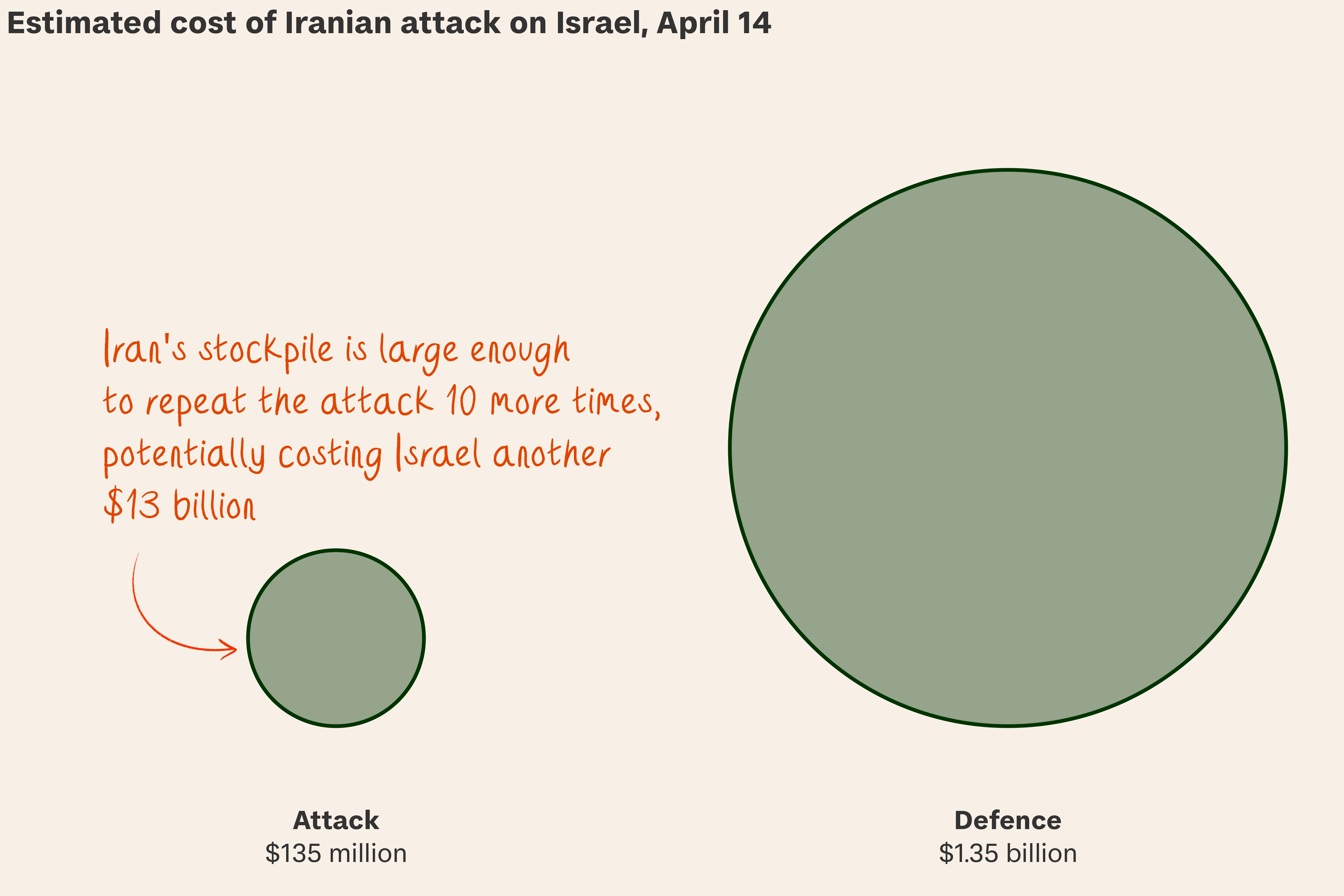
The UK and Germany sent their top diplomats to Israel yesterday to call for restraint after Iran’s drone and missile attack on 13 April. Netanyahu responded that Israel will “make our own decisions”.
So what? Iran advertised the attack in advance to signal to the US and its allies that it doesn’t want the conflict to escalate. It could spiral into something much worse anyway.
The trigger. Iran’s attack came two weeks after a presumed Israeli strike killed senior Iranian military officers at its embassy in Syria. It was unprecedented in:
- Scope. This was the first direct Iranian strike on Israel after decades of Tehran relying on proxy militias that it funds across the Middle East; and
- Scale. Tehran launched around 170 drones, 30 cruise missiles and 120 ballistic missiles, according to the Institute for the Study of War, sent in waves to arrive at around the same time.
But… it was not unexpected.
- Iran’s foreign minister said it informed “friends and neighbours” in the region about the attack 72 hours’ in advance.
- This was denied by Washington, but officials in Turkey, Jordan and Iraq told Reuters that Iran had given them a heads up.
- Iraqi sources, for example, said Iran notified Baghdad of an attack three days in advance, with exact timings handed over in time for Iraq to safeguard its airspace.
- Iran also informed Switzerland, a traditional intermediary with the West; and
- Saudi Arabia and the UAE reportedly shared intelligence that helped shape the defence response.
“There was no surprise element,” says Sanam Vakil, director of the Middle East and North Africa programme at Chatham House. “[Iran’s] message to the West and the US in particular was that their response would be calibrated.”
Unlike Russia’s attacks on Ukraine (more below); almost all of Iran’s missiles and drones were shot down, thanks to the advance warnings, Israel’s well-stocked defence systems and a US-led coalition. French and British jets helped to intercept, and Jordan shot down drones and missiles over its airspace.
The result? No deaths – although a seven-year-old girl from a village in southern Israel was seriously wounded – and minor damage to a military base.
Not concluded. Iran’s mission to the UN said on Sunday that the matter “can be deemed concluded” – unless Israel “makes another mistake”.
Despite the attack’s apparent failure, Tehran gathered useful information about Israel’s defences and forced Israel and the US to spend more than $1 billion in one night to counter an attack that cost around one-tenth of that to launch.
But Israel “cannot see the launch of 300 missiles as limited and calibrated,” says Vakil.
Netanyahu must now make a choice: show restraint and hold onto the international support it has regained this week – Biden reportedly told Netanyahu to “take the win” and made it clear the US won’t take part in a reprisal – or side with hardliners in his rightwing coalition who want Israel to “go berserk” immediately.
Options include cyberattacks (against a nuclear site, for example), targeting Iranian proxies and assets in the region or a direct strike on Iranian military targets. As well as risking open conflict with Iran, any response could also start a bigger fight with Iran-backed Hezbollah in Lebanon.
What’s more. There is a “real possibility” that the US and its allies could allow Israel a freer hand in a ground invasion of Rafah in exchange for de-escalating with Iran, says Khaled Elgindy, a senior fellow at the Middle East Institute.
And… every day that passes without a Gaza ceasefire makes an all-out regional war more likely.
The graphic at the top of this article was amended on 23 April
More than 70 countries are holding elections this year, but much of the voting will be neither free nor fair. To track Tortoise’s election coverage, go to the Democracy 2024 page on the Tortoise website.
